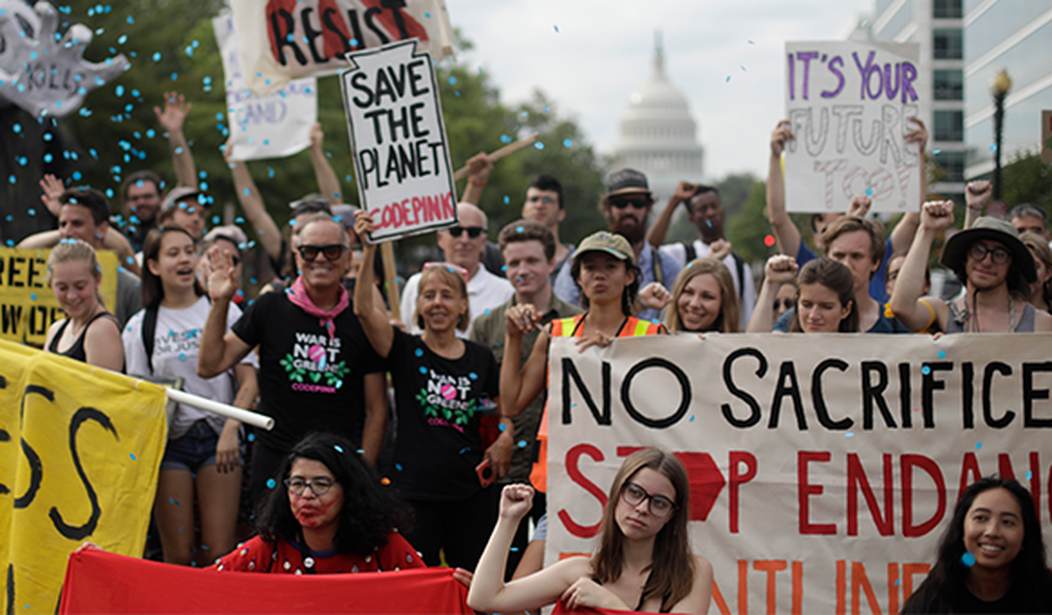Nobody loves the environment more than those of us who choose to live out in it. Most of us live out here for a reason. Privacy is one reason; privacy is one of the last few remaining rare luxuries, and it's hard to find in a huge rabbit-warren city, but rather easier out in the woods. Many of us like the peace and quiet, and many of us love being out among the wild things. The last couple of nights, here in our Susitna Valley lodgings, our game cams have picked up a cow moose and her yearling calf wandering around our yard, and while we enjoy having them, a note of caution is always in order.
But the climate scolds, the ones who claim to be so concerned with the environment and the climate, sure don't seem to know much about what makes it tick. Case in point: A Scottish brewing company, BrewDog, recently purchased a big tract of land in Scotland, intending to reforest it and claim it as an offset to the company's carbon footprint.
There was just one problem: They couldn't grow any trees, and ended up selling the land.
Brewdog has sold an £8.8m Scottish forest it acquired just five years ago after mounting losses forced it to cut spending.
The site, a former grouse moor known as the Kinrara Estate, was acquired by the brewer in 2020 to help with its net zero credentials. At the time, the Scottish brewer had grand plans to plant millions of trees and turn it into Scotland’s “biggest ever” forest.
However the initial planting was a failure because the trees died and Brewdog had now sold the estate to rewilding outfit, Oxygen Conservation.
“The time is right to hand over the reins to an organisation that specialises in protecting and investing in natural capital,” Brewdog said.
They should have stuck to brewing. Turns out a lot of their initial claims and assumptions were, as my British friend might say, bollocks. It's tempting to ask Brewdog exactly how they expected this tract of land to affect global climate change; it's a safe guess that any change would be, at the very most, a rounding error in the global scheme of things. Oh, they'll claim that they are taking the lead, that other companies will follow suit, and that together, the brewing industry, with their target BroDude demographic (any beer company called "Brewdog" will be leaning heavily on the BroDude market), will save the world from catastrophic climate change.
Again, bollocks.
Under then-chief executive James Watt, the company said the project would help it become the world’s first carbon negative beer brand and be funded partly by sales of its Lost Forest beer.
However Brewdog, which rose to prominence for its eye-catching stunts, was forced to retract many of the claims about the forest after unveiling the purchase to much fanfare.
These included admitting that the estate was actually 9,142 acres rather than over 12,000 acres as claimed and that the site would absorb much less CO2 annually than original (sic) expected.
Oops.
So, to sum up: The estate was only 3/4 of the size initially claimed, would not sequester nearly as much carbon as claimed, and, to top it all off, a brewing company failed to keep trees alive. This is what happens when corporate virtue-signaling goes wrong. This is what's happening, more and more often, to climate-scold projects around the world. Windmill farms are failing and not being replaced. Solar power farms, likewise. The climate change models are straying farther and farther from observed reality, and the crowds at climate protests are shrinking.
Even the movement's patron saint, Greta "Doom Pixie" Thunberg, has taken up running supplies to Gaza over climate-change hectoring.
Read More: Now There's This: Greenland Ice Pack Melting Models Are All Wet
Reason Is Winning: Climate-Scold Protest Numbers Are Crashing
As for Brewdog, they aren't doing so well.
The move signals Brewdog’s bid to revive its fortunes and focus on its main brewing business after a slide in sales.
The company’s latest accounts showed it posted a loss of £37m last year, the fifth consecutive year of losses.
Perhaps, not the right time to try to reverse the company's fortunes through climate-change virtue-signaling? Look, nobody likes to see a business fail. People lose money, some may be wiped out; employees lose jobs, and families fall on hard times. That's not anything to be glad about, no matter how much the management making these decisions might have it coming. But we can hope that other companies, particularly other beer companies, might learn by Brewdog's example. A beer company, after all, is heavily dependent on young men, the "BroDude" demographic, as Bud Light learned to their sorrow a couple of years back. The BroDude types generally aren't overly worried about their carbon footprint.
Oh, and that company Brewdog sold the land to? "Oxygen Conservation?" They're trying a repeat of Al Gore's "carbon credit" scam:
Founded only four years ago, Oxygen Conservation has acquired 12 estates across the country covering some 50,000 acres.
The business makes money selling carbon credits to businesses to offset their emissions.
You don't say.














